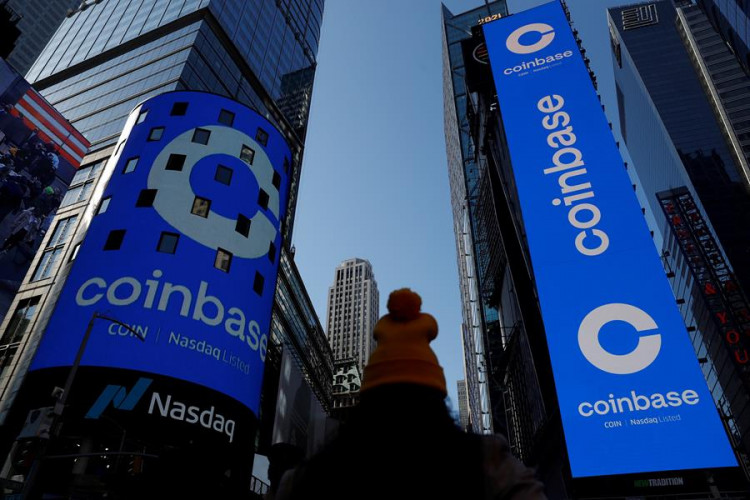Following the approval by the U.S. Securities and Exchange Commission (SEC) of applications from nearly ten investment companies, including major firms like Blackstone Group and Franklin Templeton, the first batch of Exchange-Traded Funds (ETFs) that directly invest in Bitcoin commenced trading last week. This development, seen as a crucial step that has been years in the making, is expected to facilitate wider adoption of the world's largest cryptocurrency.
Most of these ETF issuers will rely on Coinbase to some extent to ensure the operation of their funds. The digital asset exchange has positioned itself to offer custody, trading, and lending services to companies such as Blackstone.
While Coinbase stands to benefit from Bitcoin's entry into mainstream markets, these arrangements have highlighted concerns about Coinbase being seen as a potential risk focal point. Additionally, the emergence of a range of funds offering Bitcoin investment tools at lower fees poses another threat to Coinbase's core trading platform revenue.
David Schwed, Chief Operating Officer at blockchain security firm Halborn, expressed concerns about a single entity being responsible for the entire transaction lifecycle. This situation, he argues, raises issues that need attention.
Coinbase's multifaceted role has also been a focus of the SEC itself. In June, the SEC accused Coinbase of operating an unregistered exchange, broker, and clearinghouse, dealing in tokens considered securities, plunging Coinbase into legal disputes. Coinbase contested these allegations, accusing the SEC of overreach.
SEC Chairman Gary Gensler, in a statement announcing Wednesday's approvals, pointed out that the SEC does not endorse any fund's arrangements and will not approve or recognize crypto trading platforms or intermediaries that don't comply with federal securities laws and often have conflicts of interest.
Coinbase, already the world's largest crypto custodian, is the preferred custodian for Bitcoin ETFs. However, issuers have noted in risk disclosures that the company might have to limit or reduce some services offered.
Dave Abner, Chief at ETF consultancy firm Dabner Capital Partners, highlighted the apparent concentration risk due to many firms selecting Coinbase as their cryptocurrency custodian. He expressed surprise that issuers did not mandate multiple custodians to mitigate unforeseen issues.
Alesia Haas, Coinbase's Chief Financial Officer, stated that the company is "striving to avoid conflicts of interest" and that the traditional securities market structure might not apply to cryptocurrencies. A spokesperson added that Coinbase's custody business is not a problem in their case with the SEC.
Currently, Coinbase is the only trading agent for Blackstone Group, conducting buy and sell transactions for its Bitcoin ETF through Coinbase Prime. Additionally, Coinbase's lending business, though small in scale, is another crucial component in the Bitcoin ETF ecosystem. Issuers like Blackstone can borrow Bitcoin or cash from Coinbase for short-term trades.
However, Coinbase's financing capacity from its balance sheet could become a bottleneck for such trades. Blackstone Group has various ways to handle trades even if financing is not available.
Brett Tejpaul, head of Coinbase's institutional business, noted that Coinbase offers bundled services, including custody, trading, and financing, to provide a complete process service. He warned that using different providers might introduce more risks.
Despite Coinbase's stock rising nearly 400% last year alongside Bitcoin's surge, a recent report by Mizuho Bank estimates that the new ETFs might only add 5% to 10% to the company's revenue. Analysts predict ETFs could add only $25 to $30 million in custody fees and a maximum of $210 million in Bitcoin trading
revenue on the platform. Compared to Coinbase's total revenue of $2.15 billion for the nine months ending September 30, this is a modest addition.
The emergence of some existing clients opting for ETFs over purchasing Bitcoin on Coinbase is possible, as Coinbase charges higher transaction fees. Even if they don't shift their choices, Dan Dolev, a senior fintech analyst at Mizuho Bank, indicated that low ETF asset management fees could drive fee compression across the sector, impacting Coinbase.
CFO Alesia Haas expects that, despite the company possibly facing fee compression in the long term following the launch of Bitcoin ETFs, immediate pressure on transaction fees is unlikely. Greg Tusar, head of institutional products at Coinbase, believes that spot ETFs will be beneficial for the crypto market and Coinbase.
Custody fees, much lower than transaction fees, could decline further as competition in this area intensifies. Fidelity Investments is leveraging its digital assets division for custody of Bitcoin in its ETF, and Gemini, co-founded by Cameron and Tyler Winklevoss, is vying for a share, having already attracted the VanEck Bitcoin Trust Fund as a client.
Over time, ETFs, even if not mandatory, are likely to diversify by using multiple custodians to reduce dependency on a single company. Haas is prepared for this possibility, acknowledging that issuers may introduce a second custodian for redundancy and diversification as assets grow. She noted that in traditional financial markets, ETF issuers often choose multiple custodians, though she expects Coinbase to retain a significant portion of the assets.
Some see Coinbase, as a public company, being subject to more scrutiny than many other firms, as an advantage that could attract more business in the long run. Matt Hougan, Chief Investment Officer at Bitwise, chose Coinbase as a custodian because the company is "the largest and most mature."
Duke University finance professor Campbell Harvey noted that clients should feel as comfortable and confident trading on Coinbase as they do on Nasdaq.
Currently, Coinbase is reveling in its moment of triumph. With the debut of Bitcoin ETFs on Thursday, there was an upbeat atmosphere at Coinbase's New York office in Hudson Yards on Manhattan's West Side. COO Emilie Choi stated, "None of us slept, we were too excited."






